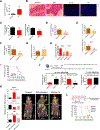Subversion of Systemic Glucose Metabolism as a Mechanism to Support the Growth of Leukemia Cells
- PMID: 30270124
- PMCID: PMC6177322
- DOI: 10.1016/j.ccell.2018.08.016
Subversion of Systemic Glucose Metabolism as a Mechanism to Support the Growth of Leukemia Cells
Abstract
From an organismal perspective, cancer cell populations can be considered analogous to parasites that compete with the host for essential systemic resources such as glucose. Here, we employed leukemia models and human leukemia samples to document a form of adaptive homeostasis, where malignant cells alter systemic physiology through impairment of both host insulin sensitivity and insulin secretion to provide tumors with increased glucose. Mechanistically, tumor cells induce high-level production of IGFBP1 from adipose tissue to mediate insulin sensitivity. Further, leukemia-induced gut dysbiosis, serotonin loss, and incretin inactivation combine to suppress insulin secretion. Importantly, attenuated disease progression and prolonged survival are achieved through disruption of the leukemia-induced adaptive homeostasis. Our studies provide a paradigm for systemic management of leukemic disease.
Keywords: IGFBP1; adaptive homeostasis; adipose tissue; insulin resistance; leukemia; microbiota; serotonin; short-chain fatty acids.
Copyright © 2018 Elsevier Inc. All rights reserved.
Conflict of interest statement
Figures








Comment in
-
Sabotaging the host.Nat Rev Cancer. 2018 Dec;18(12):722-723. doi: 10.1038/s41568-018-0078-4. Nat Rev Cancer. 2018. PMID: 30385874 No abstract available.
-
Parasitic Behavior of Leukemic Cells in Systemic Host Metabolism.Cell Metab. 2018 Dec 4;28(6):811-813. doi: 10.1016/j.cmet.2018.11.011. Cell Metab. 2018. PMID: 30517895
References
-
- Barnes KM, and Miner JL (2009). Role of resistin in insulin sensitivity in rodents and humans. Curr Protein Pept Sci 10, 96–107. - PubMed
Publication types
MeSH terms
Substances
Grants and funding
LinkOut - more resources
Full Text Sources
Medical
Research Materials

